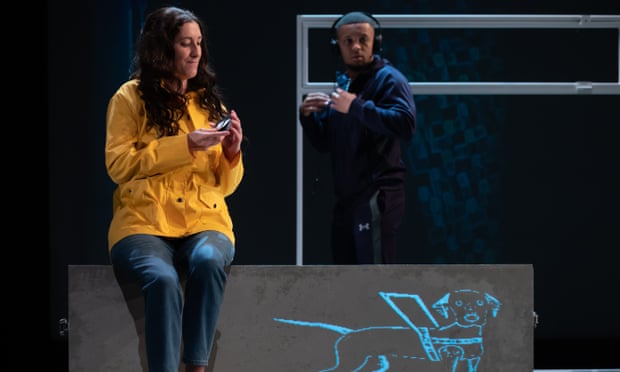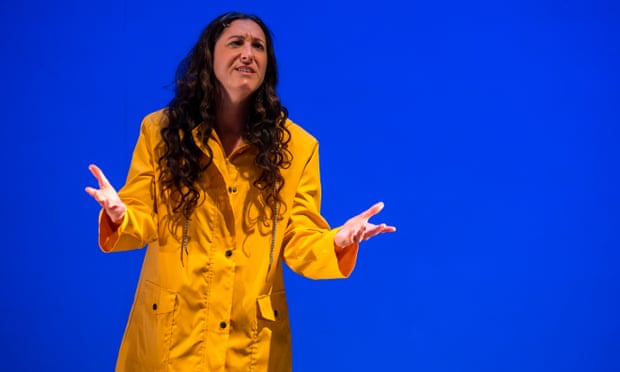Blindness on stage: ‘Until disabled people can tell their own stories, we’ll always be stereotypes’

by Caroline Butterwick | The Guardian, March 2, 2022
What is it like to navigate not only a stage but the entire theatre industry as a blind person? From the practicalities of performing to harmful preconceptions about the roles visually impaired actors can play – and how blindness itself is portrayed – there is a lot to deal with.
Actors Chloë Clarke and Douglas Walker recognise scenarios such as audition scripts printed in a font size that is too small – but they also tell me about the good practice they have experienced. Speaking over Zoom from her home in Cardiff, her guide dog resting by her feet, Clarke explains how technology helps. The 38-year-old performer, who is also an audio description consultant, uses bone-conduction headphones in rehearsals to be line-fed by a colleague, rather than struggling to sight read. She also tells me enthusiastically how her iPad is useful, “in terms of enlarging text and using the camera to zoom in on action happening in the room that I can’t otherwise see”.
Walker, a 36-year-old, Bristol-based actor, comedian and writer, says that seeing a model of the set up close during rehearsals familiarises him with the stage layout. When he is performing, bits of glow-in-the-dark tape (which the audience can’t see) are placed on the back of pieces of the set so that he can orientate himself.
There aren’t just practical implications for blind actors but questions about the roles they go for as well. How do they approach playing a fully sighted character? Maybe we should stop assuming that a character is non-disabled just because the script doesn’t specify whether they have a disability, suggests Walker. “I usually do imagine that I’m playing a fully sighted character,” he says, “but I have also had points where I have realised that it doesn’t matter, I can leave that ambiguous.”
Both have auditioned for roles as visually impaired characters. “I often audition for blind roles where they expect you to turn up looking completely blind, and the issue there is that people’s preconceptions about what a blind person looks like, of course, don’t marry with reality,” says Clarke. In these situations, she has a conversation with the creative team about how they portray blindness on stage.
Clarke explains how, early in her career, she didn’t want to be described as a visually impaired actor. But her perspective has shifted. “I’m proud to call myself a disabled person, and I’m a proud disability rights activist,” she says resolutely. She cites learning about the social model of disability in her 20s as vital to this. The social model emphasises that it is barriers in society, from unmarked steps to discriminatory attitudes, that disable people, rather than their impairment.
For Clarke, the social model doesn’t just influence her disabled identity, but also her thoughts on the controversial topic of non-disabled actors “cripping up” to play disabled characters. These actors, Clarke argues, can’t understand the societal barriers disabled people face every day. “Until you have that lived experience of being ostracised, and othered, and feared and pitied all at once, you can’t possibly represent that authentically and fairly,” she says.
Walker takes a different approach. “Acting is always about representing someone that you are not,” he says. It’s important, Walker tells me, that it’s done sensitively, with a non-disabled actor seeking out the lived experience of people they are portraying. But both Walker and Clarke highlight that in such cases, roles are being taken away from disabled actors.
Getting involved with visually impaired theatre organisation Extant was integral to Walker’s career. In 2018, he joined their artist development initiative, Pathways, which included workshops on different types of dramatic work, including Shakespeare, physical theatre and film. Other sessions focused on how to pitch yourself to casting directors and preparing for auditions. Through Pathways, he met the head casting director for the National Theatre, who invited him to – successfully – audition for a part in The Visit in 2020. “It’s undeniable that it made a difference,” says Walker of Pathways. “It wasn’t just how do you go about being an actor, but how do you go about being a visually impaired actor.” Walker learned how to advocate for himself in the industry.

In her work on Equity’s Deaf and Disabled Members’ Committee, Clarke helps support actors who have faced discrimination. Her company, Elbow Room, aims to make space in the industry for disabled performers. With Elbow Room, Clarke produced the comedy The Importance of Being Described … Earnestly?, which playfully interrogates the idea of audio description in theatre and raises questions about the challenge of getting the industry to take accessibility seriously.
It’s important, Clarke says, for theatre to move away from tropes about disabled lives – that they are always tragic or about “overcoming” – and instead recognise the diversity of experiences. “Until disabled writers, directors and casting directors become more prevalent, and disabled people can tell their own stories, we are always going to be stereotypes,” says Clarke. “The industry has got such a huge responsibility in how society perceives disabled people. I really want to see the industry starting to live up to that responsibility.”
About This Article:
A Life Worth Living has copied the content of this article under fair use in order to preserve as a post in our resource library for preservation in accessible format. Explicit permission pending.
Link to Original Article: https://www.theguardian.com/stage/2022/mar/02/blindness-on-stage-until-disabled-people-can-tell-their-own-stories-well-always-be-stereotypes

